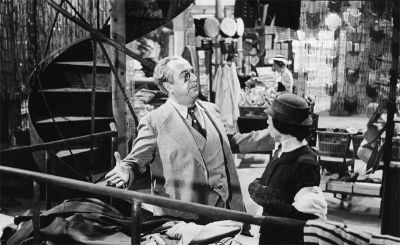
L’ÉTRANGE MONSIEUR VICTOR
(Lo strano signor Victor, Francia/1937) R.: Jean Grémillon. D.: 101'. V.francese
Introduce Paul Vecchiali
La sceneggiatura di Albert Valentin, astuta nelle sue premesse e ben costruita, possiede alcune inverosimiglianze che sarebbero senza dubbio imbarazzanti se Jean Grémillon non avesse trattato il film con quella grande umanità che rende tutto spontaneo. È senz'altro la qualità dei più grandi saper fare accettare qualsiasi cosa come se le incoerenze del racconto appartenessero ai personaggi, come se facessero parte del loro fatale destino. [...] Grémillon posa sui personaggi ordinari del film uno sguardo attento e pieno di rispetto. Tanto e così acutamente che, in questa avventura criminale dove tutto condanna il buon signor Victor, commerciante di giorno e ricettatore di notte, alla fine non si sa più bene chi siano le persone perbene e chi i mascalzoni. Viviane Romance, che trova uno dei suoi ruoli migliori, se non il migliore, incarna con eleganza una Adrienne sicura del proprio fascino ma fedele ai principi essenziali della morale. Blanchar, rimarchevole nella sofferenza e nella carica emozionale, trova la giusta misura fra l'aria febbrile, sua maschera abituale, e la rassegnazione che lascia trasparire senza bisogno di recitare. Madeleine Renaud, come donna sacrificata che finisce per scaricare un marito diventato imbarazzante dopo aver scoperto l'amore, si cala in questo personaggio ambiguo con una naturalezza inquietante. [...] Quanto a Raimu, non lo si era mai visto così tragico, se non forse in L'Homme au chapeau rond di Pierre Billon. E se, a tratti, i suoi tic riaffiorano - favoriti da dialoghisti complici - sono da mettere sul conto di un personaggio in trappola, oppresso da paura e rimorsi, sentimenti che prima gli erano estranei. In questo film raggiunge l'apice della sua espressività. Ma bisognerebbe menzionare tutte le inquadrature, sorprendersi del modo in cui Tolone è stata ricostruita negli studi di Berlino senza che perdesse la sua vitalità. A questo proposito, Grémillon, il bretone-normanno, rende un superbo omaggio alla città in quella che è la più bella inquadratura del film: Robineau (Pierre Blanchar) che è evaso dalla prigione, ritorna dalla parte del monte Faron e, mentre avanza, la macchina da presa che lo accompagna scopre la rada in tutta la sua profondità. Ci sono film che vi rendono felici. Ce ne sono altri che, in più, vi appagano per la loro complessità, per la loro intelligenza (mai ostentata) e anche per il loro rigore. Dei film, liberi, che ci provocano delle emozioni pure.
(Paul Vecchiali, L'Encinéclopédie. Cinéastes "français" des années 1930 et leur oeuvre, Éditions de l'oeil, Montreuil 2010)
Albert Valentin's screenplay, astute in its premise and solidly built, contains several far-fetched ideas that would have been embarrassing if Jean Grémillon had not treated the film with his sense of humanity that makes everything seem spontaneous. Undoubtedly the greatest directors know how to take on any work, as if the story's inconsistencies were simply a part of the characters, as if a component of their fate. [...] Grémillon depicts the ordinary characters of the film with great respect and attention. He does this to such a degree that in this crime adventure where everything points to Victor, a respectable merchant by day and a fence by night, by the end of the film it is not clear which side the good people are on and which the villains. Viviane Romance, who performs in one of her better roles, if not best, elegantly plays Adrienne who is confidently aware of her own charms but is also faithful to basic moral principles. Blanchar, whose suffering and emotional power are remarkable, perfectly balances his usual guise of feverish excitement with resignation that he shows instead of acts. Madeleine Renaud, as a woman of sacrifice who ends up leaving her husband who has become an embarrassment now that she has found love, dons this character with uncanny simplicity. [...] As for Raimu, he had never been so tragic except perhaps in L'Homme au chapeau rond by Pierre Billon. And if, at times, his tics resurface, tics exploited by servile dialogue writers, they are to be explained by a character caught in a trap, oppressed by fear and remorse, feelings that were once foreign to him. In this film he is his most expressive. The camerawork is also worth mentioning along with how admirably the vitality of Toulon was recreated in the studios of Berlin. In fact, Grémillon, a Breton-Norman, pays superb tribute to the city in what is the most beautiful shot of the film: Robineau (Pierre Blanchar), who just escaped from jail, returns to the area around Mont Faron, and while he moves forward the camera accompanying him reveals the vast harbor. There are films that make you happy. There are others that, in addition, give you a sense of satisfaction for their complexity, intelligence (which is never ostentatious), and demands. Open films that make us feel pure emotions.
(Paul Vecchiali, L'Encinéclopédie. Cinéastes "français" des années 1930 et leur oeuvre, Éditions de l'oeil, Montreuil, 2010.)

Tariffe:
Aria condizionata
Info: 051224605











